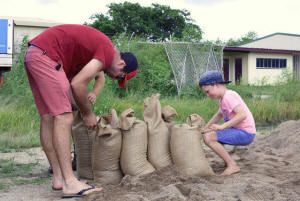|
Northeast Australia braces for cyclone,
thousands flee to higher ground
 Send a link to a friend
Send a link to a friend
 [March 27, 2017]
By Tom Westbrook [March 27, 2017]
By Tom Westbrook
SYDNEY (Reuters) - Thousands of Australians
fled their homes on Monday as a powerful cyclone bore down on coastal
towns in Queensland, where authorities urged 30,000 people to evacuate
low lying areas most at risk from tidal surges and winds of up to 300 km
per hour (185 mph).
Cyclone Debbie is expected to gather strength before making landfall in
the northeast state early on Tuesday, with the Australian Bureau of
Meteorology forecasting a category four storm, just one rung below the
most dangerous wind speed level.
The growing alarm persuaded the state government on Monday to warn some
25,000 people living in parts of Mackay, a city 950 kilometers (590
miles) north of the state capital Brisbane, to head south to higher
ground.
"Because of the intensity of this cyclone ... we are very concerned, at
the moment, at the prospect of a tidal surge in Mackay," State Premier
Annastacia Palaszczuk told reporters.
"It's very clear that the time for people to move is now."

The evacuation from Mackay would be the biggest seen in Australia since
Cyclone Tracy struck the northern city of Darwin in 1974.
State authorities had already advised thousands of residents in two
townships several hundred kilometers (miles) to the north of Mackay to
leave their homes, though some were preparing to ride out the storm.
Television images showed residents in areas around Townsville, about
400km to the north of Mackay, protecting homes and shops with sandbags
and plywood boards.
"We'll just give it a go and rally together," Cungulla resident Mike
Kennedy told the Australian Broadcasting Corporation.
Palaszczuk warned it would be the most powerful storm to hit the state
since Cyclone Yasi destroyed homes, crops and devastating island resorts
in 2011.
Authorities had set up 15 evacuation centers in safer parts of Mackay to
provide shelter for those most endangered and least able to leave,
Palaszczuk added.
Far to the north in Townsville, some 3,500 people had left, and
authorities asked 2,000 more people in the town of Bowen to also quit
their homes.
[to top of second column] |

Residents fill sandbags in preparation for the arrival of Cyclone
Debbie in the northern Australian town of Bowen, located south of
Townsville. AAP/Sarah Motherwell/via REUTERS

The Abbot Point coal terminal and ports at Mackay and Hay Point were
closed until further notice, ports spokeswoman Fiona Cunningham
said.
BHP Billiton suspended operations at its South Walker Creek coal
mine, which is just to the south of the cyclone's expected path.
Glencore said it was halting operations at the Collinsville and
Newlands coal mines.
Gales were already lashing the tourist resorts at Airlie Beach and
the Whitsunday Islands.
Townsville Airport was closed and airlines Qantas, Jetstar, Rex and
Virgin Australia said they had canceled several flights to and from
the region scheduled for Monday and Tuesday.
Queensland produces some 95 percent of Australian bananas and while
Cyclone Debbie is on course to miss the largest growing regions in
the state's far north, analysts said heavy rains and strong winds
could cause significant crop damage.
The cyclone is expected to miss most of region's coal mines, weather
and mining data in Thomson Reuters Eikon shows, and no major
dry-bulk vessels are in storm's path.
Police blamed the wild weather associated with the storm for a
traffic accident in which a 31-year-old female tourist died. Police
did not give the woman's nationality.
(Additional reporting by Byron Kaye, Sonali Paul, Colin Packham and
Benjamin Weir. Editing by Jane Wardell and Simon Cameron-Moore)
[© 2017 Thomson Reuters. All rights
reserved.]
Copyright 2017 Reuters. All rights reserved. This material may not be published,
broadcast, rewritten or redistributed.
 |